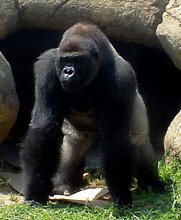Great apes love a game of charadesBy Roger Highfield, Science Editor
http://www.telegraph.co.uk/earth/main.jhtml?xml=/earth/2007/08/02/sciapes102.xml
Last Updated: 12:01am BST 02/08/2007
How to ape orang-utan
Great apes and humans have long been known to share certain character traits and now it seems they share the same tactics for playing parlour games - charades in particular.
Orangutans repeat gestures until they are fully understood
Orangutans use the same strategy that generations of partygoers follow when playing the popular game by using actions repeatedly and more frantically until they get their message across.
The findings, by researchers at the University of St Andrews and published in today's edition of Current Biology, give a remarkable glimpse of the origins of language millions of years ago and point to greater cognitive ability in orangutans.
Prof Richard Byrne of the University of St Andrews, who led the study, said: "We were surprised that the orangutans' responses so clearly signalled their assessment of the audience's comprehension.
''Looking at the tapes of the animals' responses, you can easily work out whether the orangutan thinks it has been fully, partially, or not understood, without seeing what went before.
"This means that, in effect, they are passing information back to the audience about how well they are doing in understanding them, hence our 'charades' analogy.''
The researchers presented orangutans with tempting food, such as bananas, and a not-so-tempting food item, such as a leek or celery, that had to be reached with human help.
But there was a catch. Rather than play along all the time, the researcher deliberately misunderstood the orangutan's requests, providing them with only half of the treat in some cases and, in others, handing over the less pleasant food.
In response, the apes persisted, changing their gestures to get their point across - focusing on gestures already used and repeating them frequently.
How to ape orang-utan
Note, the meaning of these gestures tends to vary from group to group, though these are common meanings:
Pucker lips as in raspberry sound (Ugh)
Point with one or two fingers extended (Give me that)
Rock/Swing entire body/ Bang the cage, or an object/ Throw an object/ Clap hands. (Hey, look at me!)
Shake hands (Quicker/hurry!)
Yawn (Do we have to do any more experiments?)
Subscribe to:
Post Comments (Atom)

No comments:
Post a Comment